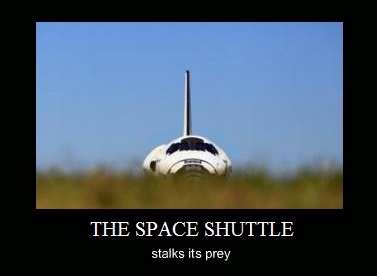“It was great being down on Cape Canaveral… we got to visit the space shuttle launching pad, and then to see an actual shuttle -- it’s a small-sized cubby; you can’t believe seven people could float around in there. But to imagine the force of the boosters that elevate the shuttle! It’s an exciting place, but I guess now, it happens so often that people take it for granted. When there’s a shuttle launch, people barely turn on the television anymore… and it’s such a stupendous piece of science that we can send people out of our atmosphere.”
So true! Hey, wasn't I just saying that?! The DVD is definitely worth the Hamilton, or at least a rental spin. When first released, I remember people grousing about how "the alien at the end was a letdown," which always made me shake my head. Carl Sagan’s novel, and the ensuing film were not “creature” features. Sagan wasn’t afraid to ask the spiritual questions, and composed intellectual critiques of the human desire to “know the answer” – but what makes some people choose science, and others choose faith?
Foster, in a trim personality summary of Sagan himself, plays a no-nonsense scientist who uses radio astronomy (including New Mexico's Very Large Array and Puerto Rico's Arecibo dish – both featured in the film) to search for extra-terrestrial life, and even she jokes about seeking “little green men.” The overall theme, symbolically, is a deeper psychological exploration of how we as a species might react if this monumental event ever truly occurred.
Would it set off religious fervor by those who cannot reconcile science with their faith and decry the evils of technology? Without doubt. We see that today. Would there be cultural and professional competition over credit and planning, territorial behavior about who gets to represent humanity, government bureaucracy, military intervention, and jokes by Jay Leno?
Um, yeah. All of that. You get ten people in a room together, they can’t decide on what kind of pizza to order. Imagine trying to get the population of Earth on board in terms of how to RSVP to an alien wormhole invitation. We worry in a general sense about whether aliens would be benevolent or hostile, but shouldn’t we also consider whether WE will choose to be benevolent or hostile?
Political maneuvering and scientific debate notwithstanding, of course, when people pay for a movie ticket, they may just want to see a peculiar alien, the goopier the better... but I guess I’ve always loved this film because the “alien,” as an actual character, was rather delightfully beside the point.
As Sagan himself noted in another, earlier book, Communication With Extraterrestrial Intelligence (1973), “In a very real sense, this search for extra-terrestrial intelligence is a search for a cosmic context for mankind, a search for who we are, where we come from, and what possibilities there are for our future – in a universe vaster than our forefathers dreamed.”




































































